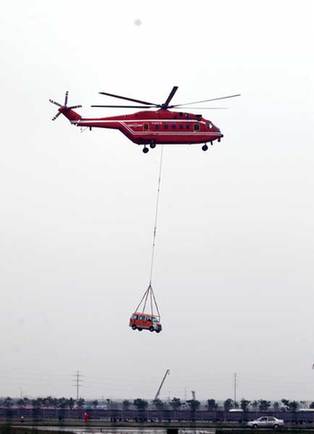China seeks to fill gap in civil aviation sector
Helicopters represent a massive growth area for China's civil aviation sector, and the national aircraft manufacturer is ready to tap into this neglected market, according to industry insiders.
There are about 30,000 helicopters in use around the world, most of them in the civil sector, said Xiao Zhiyuan, publisher of World Flight magazine.
 |
|
An AC 313 helicopter lifts a vehicle from the scene of a simulated traffic accident during the opening ceremony of the Second China Helicopter Expo in Tianjin on Thursday.Photos by Jia Lei / for China Daily |
The shortage of helicopters for civilian use has become a prominent issue in China since the country was hit by a succession of natural disasters starting in 2008, when a devastating magnitude-8 earthquake struck Sichuan province.
"Ninety-nine helicopters took part in rescue operations for the Sichuan earthquake, and nearly 70 percent of them were sent by the military. The lack of civil helicopters has since then attracted attention from authorities and the public," Xiao said, noting that the government later requested the establishment of a national aviation emergency response and rescue system that mainly uses civil helicopters.
The promotion of civil helicopters has since been substantially accelerated, with the government giving more investment and favorable policies to support the industry, he added.
His words were echoed by Cai Yi, general manager of Avicopter, a subsidiary of the Aviation Industry Corporation of China, the nation's dominant aircraft manufacturer.
"Ten years ago, China produced less than 20 helicopters a year, and after a decade of development, the annual output has increased by 10 times, with nearly 200 being delivered to our clients last year," Cai said at the Second China Helicopter Expo, held in Tianjin from Thursday to Sunday.
Wide range of use
Civil helicopters have been used in a wide range of roles, including law enforcement, forest fire patrols, the inspection on power lines and oil pipelines, as well as maritime rescue, according to Cai.
Chen Ping, deputy head of the promotion center for emergency assistance under the Ministry of Civil Affairs, said almost 40 percent of people who die in accidents go into cardiac arrest before an ambulance arrives, and 10 percent on the way to hospital, showing the importance of prompt medical assistance.
He said the fastest and most efficient rescue vehicle is a helicopter.
"After the magnitude-7 earthquake struck Ya'an, in Sichuan, in April, four helicopters sent by the People's Liberation Army made 132 flights and transported 385 injured people. They helped check several seriously hit townships that had been isolated from the outside due to destroyed roads.
"Three civil helicopters also participated in the relief work by carrying medicine and patrolling power lines."
In Liaoning province, helicopters from the maritime rescue force of the Ministry of Transport assisted in the relief efforts after floods hit several areas in the province in August, airdropping 3.6 metric tons of aid supplies and relocating 104 residents trapped or injured, according to Chen.
Chen's center has set up a training base for aviation rescue professionals in Henan province in cooperation with a Guangdong general aviation company and plans to recruit 100 helicopter pilots and 50 medical workers by the end of this year, he added.
Ten hospitals in Beijing have built landing facilities for helicopters, according to Fan Da, deputy head of Beijing Emergency Medical Center. He said the center has performed several operations in which injured people were transported to a hospital by helicopter.
He noted that the center is negotiating with Beijing police's aviation squadron on cooperation on a helicopter emergency medical service.
"Helicopters have been used by Beijing police since April 2007, when the squadron was formed," said Yang Dongfeng, chief of the aviation squadron under the city's public security bureau.
Sober attitude urged
To boost the country's civil helicopter sector, the Aviation Industry Corporation of China has integrated its three manufacturing subsidiaries and one research institute into Avicopter and is implementing a series of favorable policies to recruit talent, according to Lin Zuoming, chairman of AVIC.
"We have established an after-sales service system that can cover the entire lifespan of our helicopter products," Lin said, adding that the company will allocate more funds and resources to solve the heavy dependence on imported engines that has long haunted China's helicopter industry.
Though the prospects for China's civil helicopter market are promising, Cai suggested that local governments and private businesses should take a sober attitude and avoid blindly investing in this field.
"It seems like many local governments and companies can't wait any longer to plunge into the industry, but it will lead to cutthroat competition and a waste of resources," Cai warned.
Registration Number: 130349





